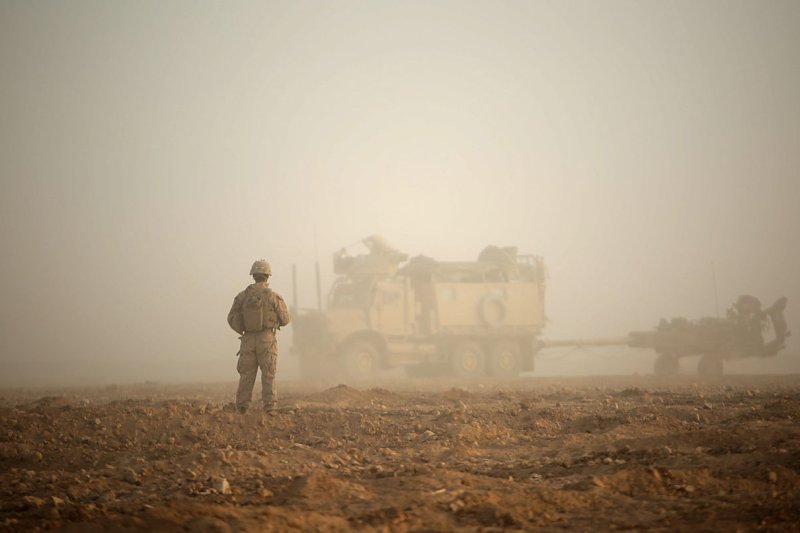A U.S. Marine waits to guide a troop movement armored vehicle towing an M777-A2 Howitzer to a firing position in an undisclosed location in Syria on May 14. File Photo by Sgt. Matthew Callahan/U.S. Marine Corps/UPI |
License Photo
June 26 (UPI) -- The United States and its allies are engaged and at war in Syria, Iraq and Afghanistan as well as against the Islamic State and other terrorist groups. The biggest and unknowable question is how might these wars end, particularly in Syria and Iraq? The answers are not reassuring.
Syria is the most complex, complicated and inherently dangerous conflict. The Syrian regime has been kept in power by relatively small but vital Russian military and Iranian contingents. These forces are locked in a fierce battle for survival with an opposition composed of many different factions, some backed by the United States, some not and, less convincingly, against the Islamic State and many other terrorist organizations. The aim is to preserve the Assad regime and, as the Russians assert, to prevent Syria from further disintegrating.
Key U.S. allies are local "democratic forces" and Kurdish Peshmerga militias. Turkey, a NATO ally of America, is engaged but has declared many of these Kurds terrorists and either supporters or extensions of the Turkish Kurdish People's Party that Istanbul is trying to crush. Last December, the Turks shot down a Russian fighter jet that barely crossed into Turkish territory. The United States has attacked Syrian forces threatening U.S. personnel training and advising the opposition forces and last week downed both a Syrian Su-22 and Iranian-built drone. In turn, Russia has threatened to target any U.S. forces that cross west of the Euphrates River.
Meanwhile, in Iraq, Iran has gained a powerful role. While Mosul has not completely been wrested from the IS, it soon will be. Then the question is what next and who will govern and rebuild that devastated city? The answers are not clear.
In Syria, the likely or predictable scenarios are fairly obvious. Assad will continue his fight for as long as it takes against opposition and Islamic groups who seek to destroy his regime. After Raqqa falls, the United States is likely to withdraw most of its forces and return to advising and training the opposition. At some stage, the civil war will end. But Syria will be devastated and rebuilding it will take decades.
The less predictable scenarios are the more worrying. U.S. and Russian air forces could engage each other accidentally or be drawn into conflict by a third party. Raqqa may prove to be a much tougher fight and more U.S. support may be needed. Iran could be a wild card and a candidate to broaden U.S. engagement by threatening or attacking U.S. forces and its opposition allies. The drone incident is suggestive of that possibility.
While this is not a July 1914 situation when the murder of Archduke Franz Ferdinand lit the fuse starting a world war, certainly it is volatile. Given the dismal state of U.S.-Russian relations, escalation, intended or not, remains a concern. And, the tragedy is that not only are there no good solutions to ending the Syrian conflict, virtually of the outcomes range from bad to worse. The most likely outcome over time is the lessening of the violence. However, all the participants have a vote and the Islamic State and other terrorist groups should not be counted out. Should the Trump administration decide to abrogate the Comprehensive Plan of Action Agreement to prevent Iran from building nuclear weapons, the risks of a greater and broader conflict can only grow larger.
Iraq is not in the same category of Syria. However, the Sunni-Shia schism has not been reconciled. Nor have relations between Baghdad and Kurdistan been resolved. Iran continues to increase its influence. Iraq, unlike Syria, is unlikely to come apart in a civil war. But it will remain politically unsettled with outbursts of al-Qaida and IS terrorist attacks that prevent Iraq from transitioning to a more peaceful and less violent society for possibly a decade or more.
To the degree that any solutions exist, the keys lie in Washington and Moscow. Both states have common interests in defeating or containing IS and other terrorist groups. Both states likewise have common interests in not seeing the conflict expand or Syria collapsing into the chaos of Libya and that of a truly failed country. Yet, the horrible state of relations may prevent interests from prevailing over these other impasses.
This is not 1914 or 1939 when World War II started. Perhaps the 30 or 100 years wars in Europe and the Spanish Civil War on steroids are better analogies. Still, the answer to the question of how these wars might end is dismal: This violence and destruction will not easily stop for a long time and could grow worse.
Harlan Ullman has served on the Senior Advisory Group for Supreme Allied Commander Europe (2004-16) and is a senior adviser at Washington, D.C.'s Atlantic Council, chairman of two private companies and principal author of the doctrine of shock and awe. His next book, due out this year, is "Anatomy of Failure: Why America Loses Wars It Starts," which argues failure to know and to understand the circumstances in which force is used guarantees failure. Follow him on Twitter @harlankullman.















